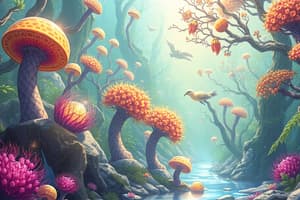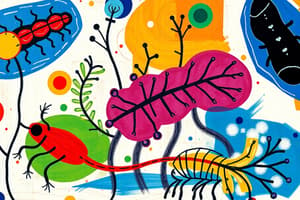Podcast
Questions and Answers
What does the Greek word 'bios' mean?
What does the Greek word 'bios' mean?
- Environment
- Study of organisms
- Life (correct)
- Interaction
Which branch of biology studies the interaction among organisms with their external environment?
Which branch of biology studies the interaction among organisms with their external environment?
- Evolutionary Biology
- Ecology (correct)
- Anatomy
- Genetics
Biology is the study of non-living things.
Biology is the study of non-living things.
False (B)
The study of heredity and transmission of traits from parent to offspring is called __________.
The study of heredity and transmission of traits from parent to offspring is called __________.
What type of tissue helps to bind other tissues?
What type of tissue helps to bind other tissues?
What is the smallest unit of life?
What is the smallest unit of life?
The groups of tissues that work together to perform closely related functions are called __________.
The groups of tissues that work together to perform closely related functions are called __________.
Which organ is NOT part of the human body system?
Which organ is NOT part of the human body system?
Match the types of cells with their descriptions:
Match the types of cells with their descriptions:
Flashcards are hidden until you start studying
Study Notes
Overview of Biology
- Biology derives from the Greek words "bios" (life) and "logus" (study), representing a systematic body of knowledge based on truth and facts.
- It focuses on the investigation, classification, structure, and relationships of living things, utilizing experimentation to explain observations.
Branches of Science
- Natural Science (NS):
- Involves understanding and describing nature, including the study of both living (Biological Science) and non-living (Physical Science) phenomena.
- Physical Science:
- Examines non-living elements; includes fields such as Physics, Chemistry, and Earth Science.
- Biological Science:
- Concerns the study of living organisms, such as Biology and Genetics.
- Social Science (SS):
- Studies human behavior and societal aspects including Politics, Economics, History, and Geography.
- Applied Science (AS):
- Practical applications of theoretical science, covering areas like Medicine, Engineering, Nursing, and Architecture.
Branches of Biology
- Ecology: Interaction among organisms and their environment.
- Genetics: Heredity and transmission of traits from parents to offspring.
- Evolutionary Biology: Changes in organisms over time.
- Cytology: Study of cells.
- Histology: Study of tissues.
- Anatomy: Structure of body parts.
- Physiology: Functions of body parts.
- Pathology: Study of diseases.
- Taxonomy: Classification of living organisms.
- Botany: Structure and functions of plants.
- Zoology: Structure and functions of animals.
- Microbiology: Study of microorganisms.
- Parasitology: Study of parasites.
- Phycology: Study of algae.
- Mycology: Study of fungi.
Levels of Biological Organization
- Life is organized hierarchically from small to large:
- Cell → Tissue → Organ → Organ System → Organism → Population → Community → Ecosystem.
Cells and Tissues
-
Cell:
- Basic unit of life, composed of living matter enclosed by a barrier.
-
Types of Cells:
- Sex Cells: Found in reproductive organs (spermatozoa - male gametes, ova/ovum - female gametes).
- Blood Cells: Produced in bone marrow.
-
Tissue:
- Groups of similar cells that perform specific functions.
- Types of Tissues:
- Connective Tissue: Binds and supports, e.g., bones.
- Epithelial Tissue: Covers surfaces, e.g., skin.
- Muscle Tissue: Facilitates movement; includes:
- Smooth (internal organs)
- Cardiac (heart)
- Skeletal (muscles connected to the skeleton)
- Nervous Tissue: Composed of nerve cells (neurons), primarily found in the brain.
Organs
- Groups of tissues that work collectively to perform closely related functions, e.g., liver, kidney, heart, and lungs.
Studying That Suits You
Use AI to generate personalized quizzes and flashcards to suit your learning preferences.




